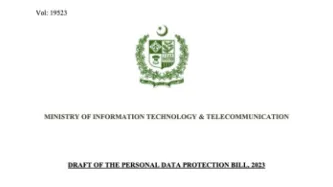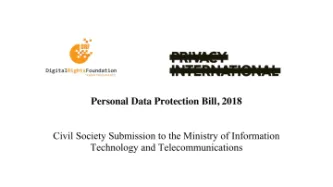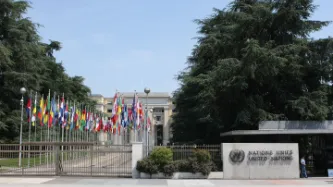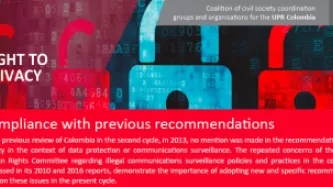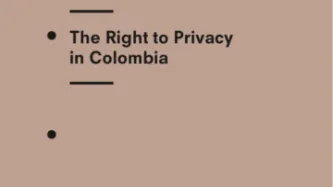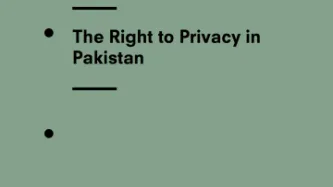Search
Content type: News & Analysis
Privacy International (PI) is concerned by developments in Pakistan regarding the enactment of the Draft Personal Data Protection Bill, 2023 and the opaque process which will see the bill become law.
The Bill was published on 19 May 2023 by the Ministry of Information Technology and Telecommunication ('MITT'). However no open and inclusive consultation was open for comments to be submitted to the MITT. In a concerning development it was reported that the Bill was approved by the Federal…
Content type: Examples
An audit of two apps and a website used by national and local governments in Colombia finds: an absence of public information about the tools, how they work, or how their security and privacy is protected; non-compliance with Colombia’s data protection legal framework, particularly in the area of consent; and reckless deployment of solutions that put hundreds of thousands of users’ personal data at risk. Fundación Karisma, which conducted the audit, makes a number of recommendations for…
Content type: Examples
The lack of data protection laws and the absence of a privacy commission are contributing factors to Pakistan’s failure to investigate or remedy security flaws in the country’s recently-launched COVID-19 tracking technology, which partially depends on a system originally developed to combat terrorism. While there are no reported cases of harassment or targeting based on the leak online of the personal details of thousands of COVID-19 volunteers, the lack of response fails to boost citizens’…
Content type: Advocacy
We welcome the effort by the Pakistani Ministry of Information Technology and Telecommunications to regulate the processing of personal data in Pakistan, and take measures to guarantee the right to privacy as guaranteed under Article 14(1) of the Constitution: “[t]he dignity of man and, subject to law, the privacy of home, shall be inviolable.”
This legislative development is crucial and timely as Pakistan continues to embrace innovative governance initiatives and deploy data-intensive systems…
Content type: News & Analysis
En el 2011 se liquidó el DAS. Las violaciones, excesos y abusos de la inteligencia estatal que comenzaban por la intimidad y terminaban con la vida de los ciudadanos habían producido condenas judiciales a varios exdirectores: claro indicador de que se necesitaba un cambio. Siete años ha tenido el Estado colombiano para ordenar la casa y esta semana someterá sus récords de derechos humanos al examen de los miembros de Naciones Unidas. La evaluación analizará, entre otros…
Content type: News & Analysis
Los frecuentes escándalos sobre el abuso de la vigilancia estatal en actividades de inteligencia, la exagerada obligación legal que tienen las empresas de telefonía de retener los datos de las comunicaciones de sus usuarios por cinco años o la manera como se diluye el concepto de privacidad en el Código de Policía serán parte del examen que se haga en el seno de la ONU sobre la forma como Colombia cumple sus compromisos de derechos humanos.
Dirigido por los Estados y con el auspicio del…
Content type: News & Analysis
In the lead-up to the 30th session of the Universal Periodic Review which took place on 10 May 2018, Fundación Karisma, a partner organisation in the Privacy International Network, joined a coalition of civil society groups in Colombia to raise more awareness about the country's human rights record.
As part of the joint effort, the coalition produced factsheets on various human rights in the Colombian context, including the right to privacy. It is available in both English and Spanish.
Content type: News & Analysis
El 10 de mayo de 2018, en el marco del 30º período de sesiones del Examen Periódico Universal (EPU) en el Consejo de Derechos Humanos de las Naciones Unidas, toca la revisión de Colombia, lo que es una oportunidad Colombia y otros Estados para declarar qué acciones han tomado para mejorar la situación de derechos humanos en sus propios países, para cumplir sus obligaciones internacionales en la materia.
Colombia se encuentra actualmente en un punto de inflexión, debido al proceso de transición…
Content type: Advocacy
Este informe de terceras partes interesadas es una contribución escrita presentada por Dejusticia, Fundación Karisma y Privacy International (PI). Dejusticia es una organización de derechos humanos colombiana que brinda conocimientos especializados sobre derechos humanos. Fundación Karisma es una organización de la sociedad civil colombiana que busca dar respuesta a las oportunidades y a las amenazas que surgen en el contexto de la tecnología para el desarrollo para el ejercicio de los derechos…
Content type: Advocacy
This stakeholder report is a submission by Dejusticia, Fundación Karisma and Privacy International (PI). Dejusticia is a Colombian human rights organization that provides expert knowledge on human rights. Fundación Karisma is a Colombian civil society organization that seeks to respond to the opportunities and threats that arise in the context of ‘technology for development’ for the exercise of human rights. PI is a human rights organisation that works to advance and promote the right to…
Content type: Long Read
To celebrate International Data Privacy Day (28 January), PI and its International Network have shared a full week of stories and research, exploring how countries are addressing data governance in light of innovations in technology and policy, and implications for the security and privacy of individuals.
At the core of data protection debates, there is a power play between empowering individuals to control their data and empowering those who use (or want to) use their data.
By…
Content type: Advocacy
In this submission, Privacy International provides the Committee with their observations to the written replies of the Pakistani government and with additional, up to date information to that contained in the brieing submitted to the Committee in advance of the adoption of the list of issues in 2016.
Content type: News & Analysis
What do Honduras, Pakistan, and Switzerland have in common? They are all bound to respect and protect the right to privacy under Article 17 of the International Covenant on Civil and Political Rights. And in July 2017, they all also happened to be under the scrutiny of the UN Human Rights Committee, which found the countries’ human rights record wanting in many respects, including the scope of their surveillance legislation.
Intelligence sharing
Reviewing Pakistan, the Committee…
